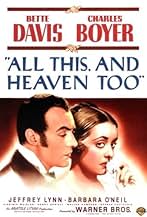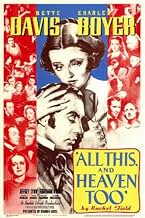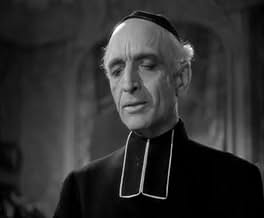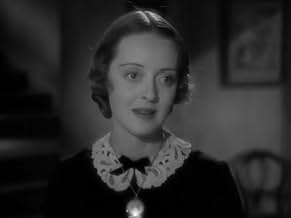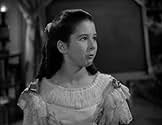Jalouse de sa servante Henriette Deluzy, qui se rapproche un peu trop de son mari à son goût, la Duchesse de Praslin la fait renvoyer, sans lettre de recommandation. Peu après, la Duchesse e... Tout lireJalouse de sa servante Henriette Deluzy, qui se rapproche un peu trop de son mari à son goût, la Duchesse de Praslin la fait renvoyer, sans lettre de recommandation. Peu après, la Duchesse est retrouvée assassinée et Henriette est arrêtée.Jalouse de sa servante Henriette Deluzy, qui se rapproche un peu trop de son mari à son goût, la Duchesse de Praslin la fait renvoyer, sans lettre de recommandation. Peu après, la Duchesse est retrouvée assassinée et Henriette est arrêtée.
- Réalisation
- Scénario
- Casting principal
- Nommé pour 3 Oscars
- 3 victoires et 3 nominations au total
- Berthe de Praslin
- (as Ann Todd)
Avis à la une
You genuinely feel like these screen children love her. And, given the time period, you feel like Boyer does to.
This is a rather long film, but the direction is solid and it just keeps moving along.
The script is really solid as well. There is little wasted time. Everything clips along rather nicely and I was surprised at how I fell under the spell of this film...
The film, except for the pro-Deluzy-Desportes slant, is excellent with a fine, restrained performance by Davis, an intense one by Boyer (who finally explodes in one scene where he shows his thorough hatred for his wife), and a marvelous performance by Barbara O'Neill as Fanny. I would thoroughly recommend this one for movie fans - a fine example of the best of Warner's historical films.
Its best features include:
Bette Davis' performance. Before this I knew she was a spectacular entertainer; now I know she can act. She is subtle and yet tremendously powerful. Her eyes, her dignified intelligence, and her self-restraint speak volumes. No camp here, just the telegraphing of quiet power.
Charles Boyer. Boyer was a man of substance; he served his country in World Wars I and II, studied philosophy at the Sorbonne, and stayed married to the same woman for over forty years. Again, as with Davis, he is restrained, as the narrative demands, but his substance telegraphs out of his body, his forced, tragic smiles, his stiff mien suddenly breaking into fitful efforts at frivolity, the quiet endurance with which he, at first, suffers his hated wife.
Barbara O'Neil is unforgettable as the Duchess de Praslin. O'Neil was the model of noble womanhood as Scarlett O'hara's mother; here she casts her decorum aside, after, first, shredding it to bits. I think I'll never be able to watch her in GWTW again without cracking up. Every Gothic Romance, including this one, requires a Hoyden - Rochester's mad wife, "Rebecca's" Mrs. Danvers. O'Neil chews them all to bits and spits them out. Even her false eyelashes appear as weapons, able to eviscerate her husband and her hated governess.
The supporting cast is no less superb. June Lockhart is a believably loving daughter; Harry Davenport, utterly un-French, is a wonderful, prophetic Pierre who warns Bette Davis and the viewer that when they enter the house of the Duke and Duchess, they enter Hell, and all hope should be abandoned.
Even the nasty girl who taunts Bette Davis at the opening of the film could not have been better cast.
Though black and white, the film reveals its high production values; it is rich and varied and offers the eye a sumptuous feast of fabrics, surfaces, and shadows. You won't miss color here at all.
I am torn about the plot, trying to decide if the movie wanted to make me, the viewer, experience the Duke as a weak man who allowed Mlle D, Bette Davis, to be exposed to so much social and emotional danger. I'd welcome others' thoughts on this question. In his apparent weakness, the Duke reminded me of the Paul Henreid, "Jerry" character in "Now Voyager," another married man who loved, and failed, a Bette Davis character.
Henriette takes over as governess in the unhappy home of the Duc, caring for his four children - played by June Lockhart, Ann Todd, Virginia Wielder, and the adorable, pouty-lipped Richard Nichols. Though Nichols appeared in films taking place in France and Sweden, he sports a thick southern accent and calls Henriette "mamZEL." The Duc is miserable with his frustrated, bitter wife. The lack of sex in the marriage is demonstrated by his escorting her to her room and kissing her hand, then departing to his own room. She writes him lots of letters which she slips under his door. Feelings develop between the Duc and Henriette, but in the film at least, these are never acted upon. Unconvinced, the Duchesse does everything she can to get rid of the governess. In the beginning of the movie, Henriette tells her story as her students find out she has spent time in prison over a double tragedy which took place in the Praslin household.
Though a tragic story on many levels, it's a beautifully told one with every detail attended to. Bette Davis is warm and restrained as Henriette, soft-spoken and deferential. Boyer, with that vein in his forehead that sticks out when he's angry, is excellent as a man at the boiling point. O'Neill is positively hateful, a credit to her marvelous performance. From the strong, generous, loving mother in "Gone With the Wind," she turns herself into a self-involved, petty harridan.
"All This and Heaven Too" will sweep you into its rich atmosphere. In fact, I remember bringing this film to my office once when I worked a night shift, figuring that my colleagues and I would watch some of it over dinner each night. We ended up watching the entire thing in one sitting - which is what happened the last time I watched it. At 141 minutes, it's not short, but it holds the attention as a great film should.
Le saviez-vous
- AnecdotesJune Lockhart's first credited role (and second film). In addition, out of the four children starring in the movie, she was the only one to continue acting into adulthood.
- GaffesThe Duchess of Praslin is seen licking envelopes in which she has placed letters to her husband, the Duc de Praslin. This film is set in the 1840s; gummed envelopes would not be invented for another 100 years. Correspondence in the 1840s would not be placed in a #10 business envelope either, as seen in the film. The letters would be placed in another sheet of paper and then sealed over with a wax seal or simply folded over and sealed with a wax seal, and sometimes a ribbon would be set in the wax as well.
- Citations
Duc de Praslin: Why are you smiling? May I share whatever pleases you so?
Henriette Deluzy-Desportes: You will think I am very silly, I'm afraid, but standing here like this with the snow falling reminds of something I used to know. Do you remember a little round glass globe that...
Duc de Praslin: Oh yes, I know, with a snow scene inside. We had a paperweight on a desk at home like that. You shook it and the snow whirled around out from nowhere in a blinding storm.
Henriette Deluzy-Desportes: Yes, that's exactly what I mean.
Duc de Praslin: And if you looked closely enough the whole world seemed to be obliberated and shut out.
- ConnexionsFeatured in AFI Life Achievement Award: A Tribute to Bette Davis (1977)
- Bandes originalesThe War of the Roses
(uncredited)
Music by M.K. Jerome
Lyrics by Jack Scholl
Played on a spinet by Bette Davis
Sung by Ann E. Todd, Virginia Weidler and June Lockhart
Meilleurs choix
- How long is All This, and Heaven Too?Alimenté par Alexa
Détails
- Date de sortie
- Pays d’origine
- Langues
- Aussi connu sous le nom de
- El cielo y tú
- Lieux de tournage
- Société de production
- Voir plus de crédits d'entreprise sur IMDbPro
Box-office
- Budget
- 1 370 000 $US (estimé)
- Durée2 heures 21 minutes
- Couleur
- Rapport de forme
- 1.37 : 1
Contribuer à cette page



